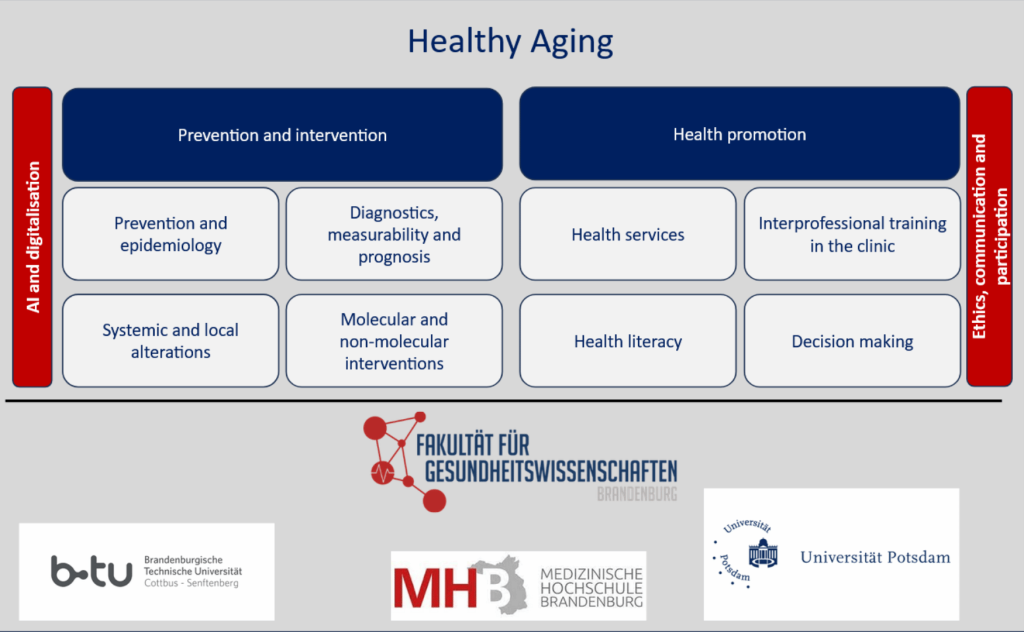The Faculty of Health Sciences (FGW) conducts research at its three supporting universities: Brandenburg University of Technology Cottbus-Senftenberg (BTU), Brandenburg Medical School Theodor Fontane (MHB) and the University of Potsdam (UP).
The two focus areas of prevention and intervention and health promotion were defined under the overarching topic of healthy ageing, with the two cross-sectional topics of AI and digitalisation as well as ethics, communication and participation.
The Faculty of Health Sciences is committed to the DFG’s current standards for good scientific practice. Further information and reports can be found under Downloads.

Graphic on the research areas of the
Faculty of Health Sciences Brandenburg (FGW)
The Maltzahn lab located at the BTU-CS is aiming to understand the changes in muscle stem cells and their niche during aging and in aging-associated diseases.
The final goal of our work is to improve muscle stem cell function and myogenic differentiation in age and disease.
Our research topics are part of the research area Prevention and Intervention (systemic and local alterations and molecular und non-molecular intervention) of the FGW, more information on our research can be found here: https://www.fgw-brandenburg.de/en/members/professorial-chairs/stem-cell-biology-of-aging/
Research of the Rossol lab (BTU-CS) is focusing on the age-associated dysregulation of monocyte functions, monocyte-to-macrophage differentiation, and monocyte subpopulations during normal aging and in aging-associated diseases.
Our research topics are part of the research area Prevention and Intervention (systemic and local changes and molecular and non-molecular intervention) of the FGW.
More information on our research can be found here: https://www.fgw-brandenburg.de/mitglieder/professuren/molekulare-immunologie/
The professorship of rehabilitation medicine focuses on two research fields:
On the one hand, we want to answer questions about phenotyping and genotyping of sarcopenia or its prevention by training/nutrition (prevention and intervention).
On the other hand, we deal with sociological aspects of occupational reintegration (health care/care in the health system) as well as with interprofessional rehabilitation-specific components in professions working on rehabilitation.
More information on our research can be found here: https://www.fgw-brandenburg.de/en/members/professorial-chairs/rehabilitation-medicine/
The Müller lab located at the UP campus in Potsdam-Golm is working both on the prevention of and the intervention in chronic and neurodegenerative diseases through lifestyle modifications with a special focus on movement behavior. To that end new digital solutions that help people to adhere to a healthy lifestyle are being developed.
We also perform basic research on the relation of exercise, brain structure and cognition. Finally, we aim to improve living conditions of those affected by chronic neurological disorders. Our research topics are part of both the research area Prevention and Intervention and the area Health Promotion of the FGW.
More information on our research can be found here: https://www.fgw-brandenburg.de/en/members/professorial-chairs/degenerative-andchronic-diseases-movement/
The Institute of Educational Research in Health Sciences is located at the Neuruppin Campus of the Brandenburg Medical School.
It researches the principles of learner-centred education and training in the health professions including human, dental and veterinary medicine within a worldwide network. The research is part of Health Promotion and is assigned to the topics ‘Interprofessional training in the clinic’ as well as ‘Decision making’.
Further information can be found on our website at https://www.fgw-brandenburg.de/en/members/professorial-chairs/health-science-education-research/
The Institute for Health Services and Health Systems Research (IVGF) is dedicated in particular to regional health services research. When determining the need for care, analyses of the spatial layout of the planning regions as well as the consideration of changes in need and range of services are of particular importance.
With the involvement of patients and stakeholders, knowledge translation supports the implementation in rural areas.
More information on our research can be found here: https://www.fgw-brandenburg.de/en/members/professorial-chairs/health-care-health-system-research/
The Ethics Lab at the FGW/University of Potsdam, led by Prof. Ranisch, focuses on the ethical and social aspects of health sciences and medicine, especially against the backdrop of the increasing use of digital technologies, Artificial Intelligence (AI), and the harnessing of large data volumes (“Big Data”).
In addition, it addresses normative questions of biotechnology research as well as participatory health research. Our research topics are part of the cross-sectional areas „KI und Digitalisierung“ (AI and Digitalization) and „Ethik, Kommunikation und Partizipation“ (Ethics, Communication, and Participation) at the FGW.
For more information on our activities in research, teaching, and ethical consultation, please visit: https://www.fgw-brandenburg.de/en/members/professorial-chairs/medical-ethics/